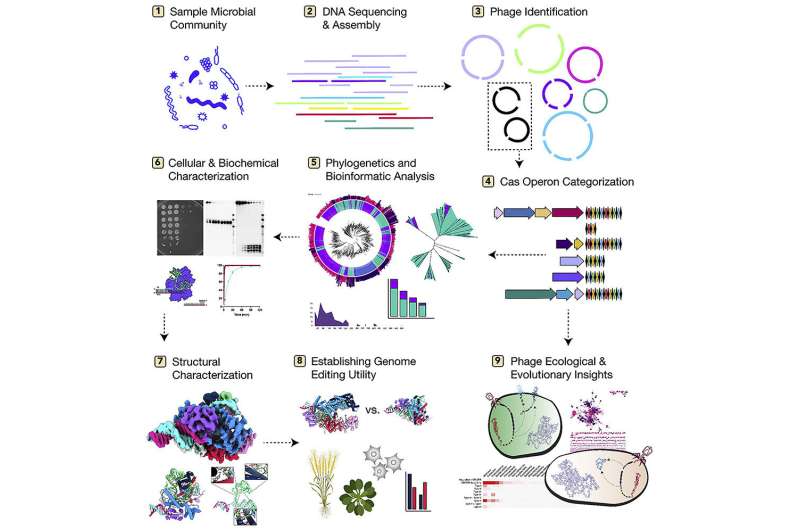November 29, 2022 report
Thousands of phages found to have CRISPR gene editing system

A team of researchers at the University of California, Berkeley, and University of California, Los Angeles, working with a colleague from Vilnius University, has found evidence of thousands of phages with DNA strands that should allow them to conduct gene editing on other viruses or bacteria. Their paper has been published in the open-access journal Cell.
In 2012, some of the researchers on this same team discovered that CRISPR-Cas9 could be programmed using RNA to edit targeted DNA strands from other organisms (and won a Nobel prize for it). Their work emerged from findings that many types of bacteria use CRISPR-Cas systems to defend against viral attacks. Using such systems, bacteria can cut and remove strands of DNA from viruses and store them in their own genomes to combat the same viral strain should it attack again.
Since that time, researchers have found that some viruses have similar machinery, but it was deemed to be rare. In this new effort, the researchers sought to determine actual prevalence.
The work involved analyzing the DNA of thousands of phages (types of viruses that attack bacteria) for evidence of DNA that would support a CRISPR system. The researchers found more than 6,000 of them, proving that they are not rare at all.
The researchers suggest the DNA snippets they found were likely stolen from bacteria and might be used in similar ways to ward off other phages or even bacteria. More work is required to confirm their suspicions. But in the meantime, by taking a closer look at some of the gene snippets, the researchers found that not all of the systems were the same—some appeared to be smaller and more efficient than others. The finding could help scientists currently using such systems to edit cells for human purposes. It could also inspire new types of biotechnology, such as using systems found in phages to edit genes where current systems are too large.
More information: Basem Al-Shayeb et al, Diverse virus-encoded CRISPR-Cas systems include streamlined genome editors, Cell (2022). DOI: 10.1016/j.cell.2022.10.020
Journal information: Cell
© 2022 Science X Network


















